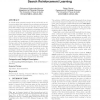1512 search results - page 64 / 303 » Qualitative reinforcement learning |
ATAL
2007
Springer
14 years 2 months ago
2007
Springer
Temporal difference reinforcement learning algorithms are perfectly suited to autonomous agents because they learn directly from an agent’s experience based on sequential actio...
ESANN
2007
13 years 9 months ago
2007
The eligibility trace is one of the most used mechanisms to speed up reinforcement learning. Earlier reported experiments seem to indicate that replacing eligibility traces would p...
ATAL
2009
Springer
14 years 2 months ago
2009
Springer
In several agent-oriented scenarios in the real world, an autonomous agent that is situated in an unknown environment must learn through a process of trial and error to take actio...
IWANN
1999
Springer
14 years 2 days ago
1999
Springer
To avoid the curse of dimensionality, function approximators are used in reinforcement learning to learn value functions for individual states. In order to make better use of comp...
WOSS
2004
ACM
14 years 1 months ago
2004
ACM
Components in a decentralised system are faced with uncertainty as how to best adapt to a changing environment to maintain or optimise system performance. How can individual compo...

